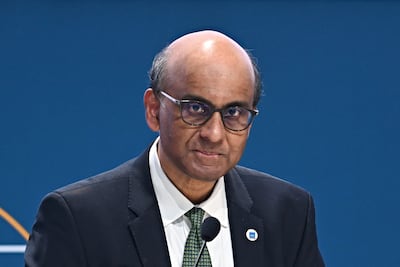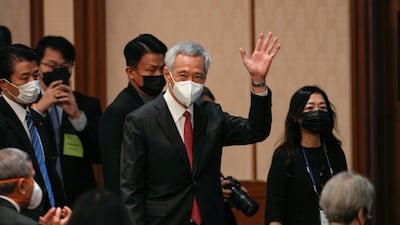When Singaporeans cast their votes to elect their next president, at some point before mid-September, the result appears to be a foregone conclusion.
Tharman Shanmugaratnam, the former senior minister and deputy prime minister in the ruling People's Action Party government and one of the most popular politicians in the country (even the opposition like him), is expected to win the largely ceremonial position of head of state very comfortably.
Capping his 22-year career as an MP and minister with the presidency may well be an honour. But it raises one question for many. Why couldn’t Mr Tharman have succeeded the current prime minister, Lee Hsien Loong, when he decides to step down?
The man himself has long batted away such suggestions, telling the media “I’m good at policymaking, I’m good at advising my younger colleagues, and at supporting the PM – not at being the PM. That’s not me.”
Mr Tharman was speaking in 2016, when the subject was a hot topic because a Yahoo poll had put support for him to be premier at 55 per cent – with the next contender on 17 per cent.

His popularity hasn’t waned. In the 2020 general election Mr Tharman led his team in his multi-member constituency to victory with an impressive 75 per cent of the vote. So why shouldn’t he be a candidate for the premiership? The incumbent, Mr Lee, gave the answer in 2019.
“I think that ethnic considerations are never absent when voters vote,” he told an interviewer. Asked specifically whether Singapore – whose main ethnic groups are Chinese at 74 per cent, Malays at 13 per cent and Indians at 9 per cent – was ready for a non-Chinese leader, he said: “If you ask whether it will happen tomorrow, I do not think so.”
In neighbouring Malaysia and Indonesia, on the other hand, it is inconceivable that an ethnic Chinese person or any non-Muslim could become the country’s leader. The percentage of minorities is different in the two countries – Chinese make up 23 per cent of the population in Malaysia, with Indians at seven per cent, whereas in Indonesia the Chinese are only reckoned to constitute just over one per cent, albeit of a much larger population of 282 million, as opposed to 33 million in Malaysia.
This view, that only a member of the country’s majority ethnic group and religion should be the leader, goes further. When an ethnic Chinese was appointed Malaysia’s finance minister and an ethnic Indian attorney general in 2018, it was highly controversial.
And having been President Joko Widodo’s deputy when he was governor of Jakarta didn’t protect Basuki Tjahaja Purnama, an ethnic Chinese Christian who had succeeded his former boss as governor, from what many thought were dubious blasphemy charges in 2017, when he was sentenced to two years in jail.
But outsiders who view all this over-simplistically should take a pause. They should remember that it is only very recently that people of colour have attained the highest office in Europe and North America. The nonchalance with which Britons greeted Rishi Sunak as their first non-white prime minister was remarkable, but relatively new. There might also be some who say that throughout history, it has been the natural order of things for a leader to be from a majority or dominant ethnic group.
But there are other reasons for South-East Asian countries to take such a view. The history of communal tensions spilling over into rioting is so seared into the national consciousnesses that anything that could possibly upset inter-ethnic relations is ultra-sensitive, if not to be avoided at all costs.
Having been ruled by the British and the Dutch for centuries, local populations may have a degree of paranoia about post-colonial interference. Certainly, in Malaysia there was a fear among the majority Malays of “not being masters in the only country they can call their own”.
It may not be justified today, but it was in 1970 when Malays and other indigenous peoples owned a mere four per cent of the country’s wealth.
What may look like rigidity about race relations to some is particularly strictly followed in Singapore, where housing is deliberately mixed so one-racial enclaves don’t develop, and where the Home Affairs minister K Shanmugam has recently said the government is "publicly committed to keeping our percentages [of race] more or less constant".
But it is all done in the pursuit of harmony. And in countries where, first, the community comes before the individual, and second, history has shown them that care needs to be taken, it has, to a large degree succeeded. There may be a glass ceiling in politics, but in other areas of life, particularly in business, ethnic minorities have excelled.
Comparing this to France, where the frustration and anger of youths of North African and Arab descent was one of the main causes of the recent riots, a Malaysian friend returning from Europe said to me: “Thank goodness we live in Kuala Lumpur!” Such scenes are unthinkable here (as are activists gluing themselves to whatever immovable objects they can find, which she also mentioned).
It would be fair to acknowledge that race-based stereotyping is common in South-East Asia. Sometimes that is harmless.
Every time I’ve gone to a stand-up comedy set in Kuala Lumpur, there have been jokes based on caricatures – which everyone laughs at, regardless of ethnicity. Sometimes less so, as in former premier Dr Mahathir Mohamad’s bizarre and divisive claim this week that promoting a multi-ethnic country was against the Malaysian constitution.
But understandable though it may be for historical reasons, if the idea that only members of one ethnicity or religion can occupy the highest office prevents the greatest talents from realising their potential, that is only going to hinder those countries. Future generations will benefit if they can be open to any of their countrymen and women becoming their leaders. On this, I concur with Singapore’s Mr Lee. “It is not impossible,” he has said, “and I hope one day it will happen."


